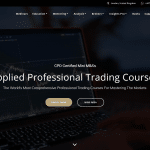The term Masters in Trading has long been associated with prestige, complex financial models, and high barriers to entry. For decades, ambitious professionals have pursued MScs and MBAs from elite universities hoping to land positions on the trading floors of top investment banks or quant hedge funds. Yet in 2025, a shift is taking place. Traditional academic paths are being challenged by more efficient, application-first alternatives — none more notable than the Mini MBA in Applied Professional Forex Trading & the Mini MBA in Applied Professional Stock Trading from Traders MBA.
This article explores the most respected master’s-level trading programmes worldwide and shows why more students are choosing an accredited, skills-based Mini MBA that delivers real trading capability — not just academic theory.
What Is a Masters in Trading?
A Masters in Trading is a postgraduate academic degree designed to prepare students for careers in financial markets. Programmes typically include:
- Derivatives and options pricing
- Quantitative modelling and stochastic calculus
- Market microstructure and algorithmic trading
- Financial risk management
- Investment banking and portfolio theory
- Simulation-based strategy projects (in some cases)
While these programmes offer strong academic credentials, they’re often expensive, time-consuming, and lack exposure to real market execution. The average duration is 12–24 months, and the typical tuition ranges between £20,000 and £60,000, not including living costs.
Top Masters in Trading Programmes Worldwide (2025)
| University / Institution | Programme | Duration | Fees | Live Trading Experience |
|---|---|---|---|---|
| Bayes Business School (UK) | MSc Mathematical Trading & Finance | 12 months | £33,100 | Yes – Bloomberg terminals, algorithmic strategy simulation |
| Loughborough University (UK) | MSc Finance & Global Trading | 12 months | £29,500 | Yes – ZISHI trading floor and VTCT Diploma |
| University of Geneva (Switzerland) | MSc Commodity Trading | 12 months | CHF 30,000 | Yes – Focused on physical trade, logistics, finance |
| Cambridge Judge (UK) | MFin | 12 months | £55,000 | Limited – Mostly corporate finance, no dedicated trading desk |
| Oxford Saïd (UK) | MSc Financial Economics | 9 months | £62,920 | Some – Oxford Finance Lab |
| MIT Sloan (USA) | MFin | 12–18 months | $91,000–$125,000 | Moderate – Includes analytics and strategy labs |
| Princeton (USA) | MFin | 2 years | ~$120,000 | Some – Quantitative trading and internships |
| EDHEC (France) | MSc Financial Engineering | ~18 months | €29,000 | Yes – Simulations and proprietary trading tools |
| HEC Paris (France) | MSc Finance | 10 months | €45,900 | Some – London floor study trips and electives |
| WorldQuant University (Online) | MSc Financial Engineering | 24 months | Free | Limited – Fully theoretical, remote-based |
| Dublin Business School (Ireland) | MSc Trading & Investing | 12–24 months | €14,000 | Some – Capstone strategy simulation |
| Sunderland University London (UK) | MSc FinTech & Trading | 12 months | £16,500 | Yes – LSEG terminal access |
| Georgetown (Online) | MSc in Finance | 21 months | ~$78,000 | Limited – Virtual portfolio simulations |
| Carnegie Mellon (USA) | MSc Computational Finance | 16 months | $100,685 | Moderate – Model-driven trading projects |
| Wharton MBA (USA) | MBA with Finance Major | ~21 months | ~$160,000 | Minimal – Internship-based exposure only |
Where These Programmes Fall Short
Despite strong brand recognition, most traditional trading degrees share critical limitations:
- High Cost: £30k–£60k average tuition, plus housing, visas, and travel
- Lengthy Commitment: 12–24 months full-time
- Theoretical Emphasis: Most include limited practical trading; simulations are dated or generic
- Academic Overload: Exams, dissertations, and electives crowd out hands-on skill development
- Delayed ROI: Graduates still require internships or job placements post-degree
While these degrees may be beneficial for corporate finance or quant careers, they rarely deliver real trading readiness.
The Mini MBA in Applied Professional Trading
Offered by Traders MBA, the Mini MBA in Applied Professional Forex Trading & the Mini MBA in Applied Professional Stock Trading is an accredited, CPD-certified programme designed for live market success.
Programme Overview
- Duration: 12 weeks (self-paced, with 1-year access)
- Cost: £1,999 — total, all inclusive
- Delivery: 100% online, accessible worldwide
- Certification: CPD UK accredited
- Tracks Available:
Key Features
- Live Market Training: Execute real trades using institutional frameworks
- Macro + Sentiment + Technical Strategy: Learn convergence-based setups
- Risk and Psychology Focus: Capital protection, mindset, and drawdown planning
- Mentor Support: Built by ex-institutional traders with real desk experience
- Optional Add-ons: Algorithmic trading and Python system building
Unlike traditional MSc programmes, the Mini MBA is outcome-driven: no dissertations, no filler modules, and no academic bureaucracy — just trading excellence.
Mini MBA vs Traditional MSc Programmes
| Feature | Mini MBA – Traders MBA | Traditional Masters Programmes |
|---|---|---|
| Cost | £1,999 | £20,000–£60,000 |
| Duration | 12 weeks | 12–24 months |
| Format | Fully online | On-campus or hybrid |
| Accreditation | CPD UK | University-accredited |
| Live Trading | Yes – core feature | Rare or simulated |
| Technical Strategy | Included | Sometimes optional |
| Trading Psychology | Integrated | Often excluded |
| Quant/Algo Modules | Optional add-ons | Mandatory in quant MScs |
| Final Output | Job-ready trade competency | Academic degree |
| Ideal For | Prop traders, retail, fast-track | Investment banking, corporate finance |
Why It Makes More Sense in 2025
The market no longer rewards credentials — it rewards capability. Prop trading firms, funded account providers, and private capital allocators want traders who can execute with discipline, not just graduates who can recite the Black-Scholes equation.
Here’s why the Mini MBA makes more sense:
- Faster ROI: You can start applying your skills in 90 days
- Practical Delivery: Learn what actually works — with no academic fluff
- Live Market Experience: Practice in real-time, not theory
- Global Access: Study from anywhere; no visa or relocation required
- Career-Ready Certification: CPD UK accreditation recognised across industries
Conclusion
A Masters in Trading used to be the only serious option — but not anymore. While university degrees offer prestige, they fall short on trading execution, cost-efficiency, and real-world strategy.
The Mini MBA in Applied Professional Forex Trading & the Mini MBA in Applied Professional Stock Trading from Traders MBA is the first fully-accredited programme to deliver everything traditional MScs can’t: live markets, strategy convergence, institutional risk control, and real-time execution — at a fraction of the cost and in a fraction of the time.
For serious traders who want results, not just credentials, the Mini MBA is no longer the alternative — it’s the new standard.
Learn more:
Mini MBA in Applied Professional Forex Trading
Mini MBA in Applied Professional Stock Trading
Frequently Asked Questions
What is a Masters in Trading?
A Masters in Trading is a postgraduate degree that teaches financial theory, quantitative modelling, derivatives, and market microstructure. These programs are often 12–24 months long and cost between £20,000 and £60,000.
What is the best Masters in Trading in 2025?
Bayes, Loughborough, MIT Sloan, and Princeton offer some of the top Masters in Trading. However, the Mini MBA in Applied Professional Trading from Traders MBA is emerging as a superior option due to its live trading focus, speed, affordability, and CPD UK accreditation.
Is the Mini MBA in Applied Professional Trading accredited?
Yes. The Mini MBA is accredited by CPD UK, making it a recognised professional qualification for trading and financial education worldwide.
How long does the Mini MBA take?
The Mini MBA in Applied Professional Trading takes 12 weeks to complete, with one-year access for flexible, self-paced study.
How much does the Mini MBA cost?
The Mini MBA from Traders MBA costs £1,999 in total — significantly more affordable than traditional MSc or MBA programmes in trading.




Leave a Reply
Please log in or register to share your thoughts.